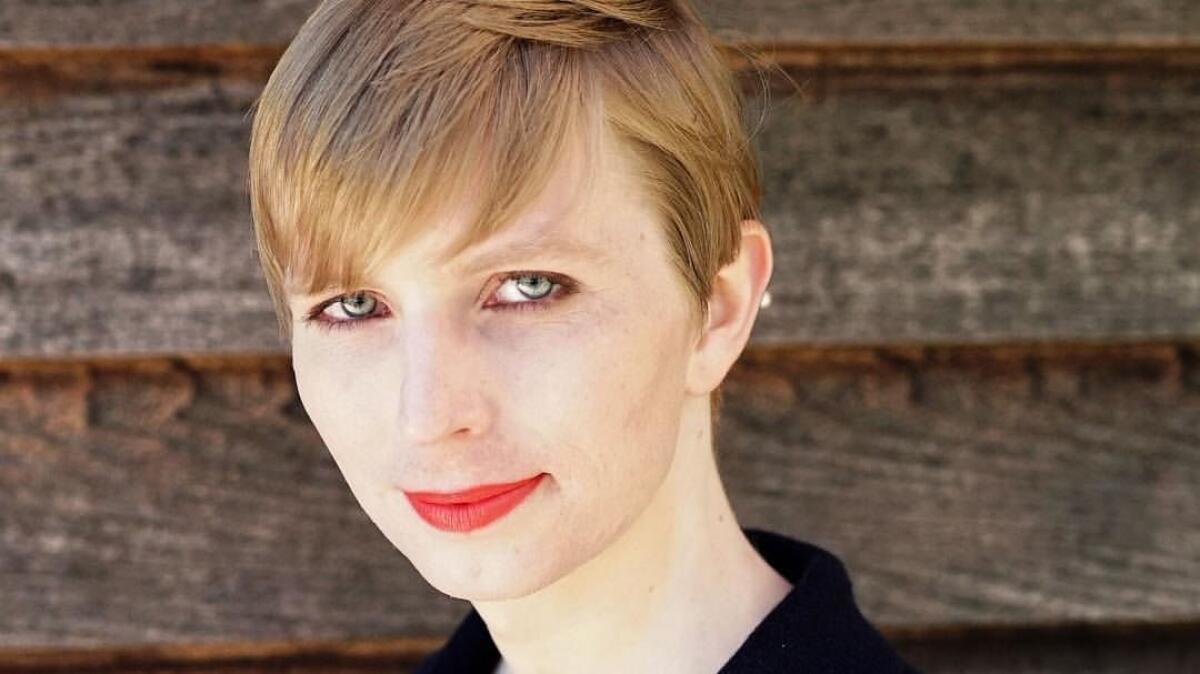Op-Ed: Chelsea Manning, don’t follow in Caitlyn Jenner’s footsteps

- Share via
Could anyone have dreamed up a more complex pop icon and trans heroine than Chelsea Manning? The former Army intelligence analyst, born Bradley Manning, who turned over a trove of classified files to WikiLeaks downloaded while she was stationed in an Iraq war zone, came out as a trans woman upon being sentenced to a 35-year prison term for violating the Espionage Act. President Obama commuted 28 years of that sentence, and last week Manning emerged from Ft. Leavenworth military prison with a Twitter following of 220,000 and a “here I am” photo that’s gone viral.
Manning’s treatment as a prisoner, which a U.N. investigator pronounced “cruel, inhuman, and degrading,” was emblematic of the brutal conditions trans men and women face in the penal system. She was held in solitary confinement for nine months awaiting trial and endured another stint in solitary as a “disciplinary measure” for a suicide attempt. Contrary to the recommendations of military doctors, she was incarcerated in a men’s facility and at first denied hormone therapy and reassignment surgery.
Her brave and eloquent appeals for humane treatment caught the attention of many in the trans community, and of progressives in general. She has inspired an opera, several stage plays and an upcoming documentary that’s being shopped at Cannes. For years, “Free Chelsea” signs appeared regularly at gay pride parades. To call Manning a cause célèbre would be an understatement.
To label [Manning] a heroic whistle-blower is to ignore much about her case.
But the “Free Chelsea” movement has been mainly an effort to vindicate her as a whistle-blower, and this gives me pause. Had Manning hand-selected data to leak to Julian Assange’s disruptive website, I could see her as a whistle-blower. But she blew something much larger than a whistle: more than 700,000 files, including 250,000 U.S. diplomatic cables, from which no innocent names were redacted. Before and after she carried out the data dump she was in a highly unstable emotional state: in the throes of a romantic breakup, gender dysphoria, a recent incident of self-harm, and a physical altercation with another intelligence analyst that resulted in a demotion in Manning’s rank. To her credit, Manning intelligently expresses her strong feelings about the American military atrocities she wanted exposed. But to label her a heroic whistle-blower is to ignore much about this case.
It also risks adding to the widespread discrimination trans people face. At the heart of transphobia is an irrational fear that we aren’t to be trusted. It exposes us to violence and hurts us with employers, landlords, shopkeepers — you name it. Until recently Hollywood presented trans women exclusively as criminals, spies and figures of intrigue, always scheming and in disguise. Think of films such as “Silence of the Lambs,” “Dressed to Kill” and “The Crying Game.”
Manning, having committed the largest intelligence breach in American history, perfectly and unfortunately fits this script. As trans writer Katherine Cross put it, “We had to prepare for the fact that the face of the ultimate civic betrayal would be a trans face.”
For Manning personally, fame would seem to be the last thing she needs right now. Returning to freedom is precarious for any former inmate, let alone someone who began a gender transition and twice attempted suicide behind bars. “She’s going to need food, and she has debts that she has to pay off,” Chase Strangio, Manning’s ACLU attorney, told Rolling Stone, as he rattled off a list of life skills she’ll need to learn: paying rent, cooking, finding a doctor, a community of friends and a place to do laundry. She will also need protection; who knows how many will target her — beginning with President Trump, who tweeted in January: “Ungrateful TRAITOR Chelsea Manning, who should never have been released from prison….”
If Manning chooses to take up the mantle of celebrity trans role model — there are already reports of a Vogue fashion spread in the works — I hope she first spends some time getting to know our community, which is now her community. This is something Caitlyn Jenner never did. Instead Jenner merely anointed herself a trans spokesperson and then conducted her life as a walking publicity stunt. Jenner has proven herself a danger to trans men and women, embracing Sen. Ted Cruz (who wants to eradicate us), Trump (who she said “would be good for women’s issues”) and, at least for a while, advocating for “traditional” marriage because she didn’t “get” marriage equality.
To a certain extent, Chelsea Manning can’t control her fame. But to a certain extent, she can. Even though our media-crazed society sends the message that a life without fame isn’t worth living (23 suicides of former reality TV stars since 2004 attest to this), there are some who were once front-page fodder but didn’t try to parlay it into a full-time gig or monetize it. Anita Hill is one such person; Monica Lewinsky is another.
Chelsea, if you’re reading this, I wish for you a long healthy life with many chapters to come. That would make you my role model.
Diana Goetsch is a poet and the author of the blog “Life in Transition” on the American Scholar website from 2015 to 2016.
Follow the Opinion section on Twitter @latimesopinionand Facebook
MORE FROM OPINION
Why do billionaires care so much about charter schools?
If you plan on having a baby under Trumpcare, you better start saving now
Even Donald Trump should know you don’t interfere with a federal investigation
Lindsey Graham is right: John Cornyn shouldn’t be the next FBI director
More to Read
A cure for the common opinion
Get thought-provoking perspectives with our weekly newsletter.
You may occasionally receive promotional content from the Los Angeles Times.










